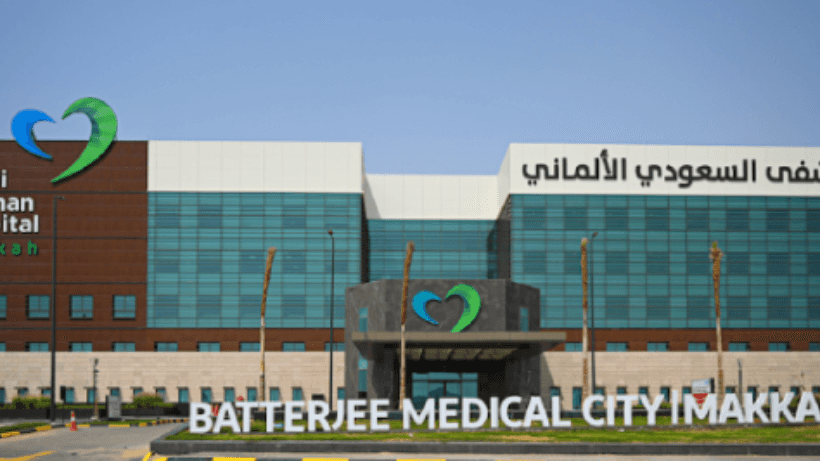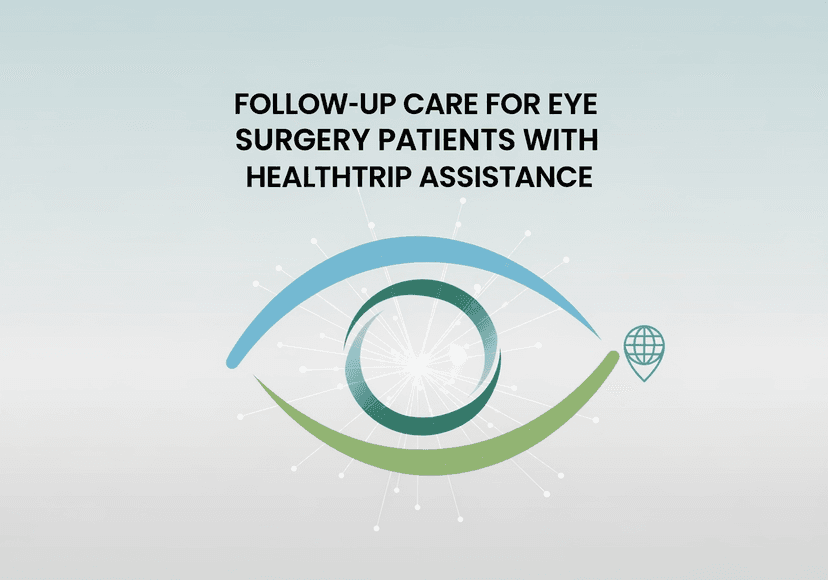
Ovarian Cancer Treatment at Saudi German Hospital Makkah, Saudi Arabia
28 Oct, 2023
 Healthtrip
HealthtripIntroduction:
Ovarian cancer is a formidable adversary, but with advancements in medical technology and healthcare facilities, there is hope for early diagnosis and effective treatment. Saudi German Hospital in Makkah, Saudi Arabia, has emerged as a healthcare institution at the forefront of providing comprehensive and advanced care for ovarian cancer patients. This blog will delve into the various aspects of ovarian cancer treatment at Saudi German Hospital, including the diagnosis, symptoms, benefits, risks, and the packages offered.
About Saudi German Hospital
Established in 2022, the Saudi German Hospital in Makkah, Saudi Arabia, is the eighth branch of this renowned hospital group in the Kingdom. This state-of-the-art hospital is equipped with the latest medical technology and equipment, making it a significant addition to the healthcare sector, not only serving the people of Makkah Al-Mukarramah but also welcoming visitors from all over the world. It embodies the commitment of Saudi German Hospitals Group to healthcare excellence, aligning with the Vision 2030 initiative.Most popular procedures in India

Wellness Treatments
Give yourself the time to relax
Lowest Prices Guaranteed!

Lowest Prices Guaranteed!
Benefits of Choosing Saudi German Hospital Makkah for Ovarian Cancer Treatment
When facing a diagnosis of ovarian cancer, selecting the right healthcare facility can greatly impact the course of treatment and the overall patient experience. Saudi German Hospital Makkah offers a range of significant benefits that make it a compelling choice for ovarian cancer treatment:
1. State-of-the-Art Facilities: Saudi German Hospital Makkah is equipped with cutting-edge medical technology and state-of-the-art facilities. This ensures that patients have access to the latest advancements in diagnostics and treatment.
2. Expert Medical Team: The hospital boasts a team of highly experienced and specialized medical professionals, including gynecologic oncologists, surgeons, oncology nurses, and support staff who are dedicated to providing the highest quality care.
3. Comprehensive Treatment Options: The hospital offers a wide range of ovarian cancer treatment options, including surgery, chemotherapy, radiation therapy, and supportive care. The treatment plan is customized to meet the specific needs of each patient, ensuring the best possible outcome.
4. Patient-Centric Care: Saudi German Hospital is committed to treating patients like family. This patient-centric approach ensures compassionate and personalized care that takes into account not only the physical well-being but also the emotional and psychological aspects of the patient's journey.
5. Multidisciplinary Approach: Ovarian cancer treatment often requires a multidisciplinary approach involving various specialists. At Saudi German Hospital Makkah, different medical disciplines collaborate to provide a well-rounded treatment plan tailored to the individual patient.
6. Research and Innovation: The hospital emphasizes research and innovation in the field of oncology. This commitment to staying at the forefront of medical advancements means that patients have access to the most promising and effective treatments.
7. Supportive Services: Beyond medical treatment, Saudi German Hospital Makkah offers a range of supportive services, including psychological support, support groups, nutritional guidance, and palliative care. These services ensure that the patient's overall well-being is addressed during their treatment journey.
Common Symptoms of Ovarian Cancer
Recognizing the common symptoms of ovarian cancer is essential for early detection and timely treatment. Ovarian cancer often presents with subtle or nonspecific symptoms, which can make diagnosis challenging. It's important for individuals to be aware of the following common symptoms:
1. Abdominal Bloating or Swelling: Persistent and unexplained abdominal bloating or swelling is a frequent early sign of ovarian cancer. It may feel like fullness or discomfort in the abdominal area.
2. Pelvic Pain or Discomfort: Ovarian cancer can cause chronic pelvic pain or pressure. This pain may be localized in the pelvic region and can sometimes be mistaken for other gynecological issues.
3. Changes in Bowel Habits: Ovarian cancer can lead to changes in bowel habits, such as constipation or diarrhea, which are not related to dietary factors or other common causes.
4. Frequent Urination: An increased urgency or frequency of urination, without any underlying urinary tract infection, can be an early symptom of ovarian cancer.
5. Loss of Appetite: Ovarian cancer may result in a significant loss of appetite, leading to unintended weight loss.
6. Unexplained Weight Loss: Significant and unexplained weight loss, not attributable to changes in diet or physical activity, may be a concerning symptom associated with ovarian cancer.
7. Fatigue: Unexplained fatigue or a persistent lack of energy that interferes with daily activities can be a symptom, particularly in advanced stages of ovarian cancer.
Diagnosis of Ovarian Cancer
Diagnosing ovarian cancer is a multi-faceted process that involves several key steps and medical tests. Early and accurate diagnosis is crucial for determining the most effective treatment approach. At Saudi German Hospital Makkah, the diagnosis of ovarian cancer is a meticulously conducted procedure, including:
1. Medical History and Physical Examination: The initial step involves a comprehensive review of the patient's medical history and a thorough physical examination. This helps the medical team assess the patient's overall health and identify any potential risk factors.
2. Imaging Tests: Advanced imaging technologies, such as CT scans and MRI (Magnetic Resonance Imaging), are employed to obtain detailed images of the ovaries and surrounding structures. These imaging tests aid in the visualization of any abnormalities or tumors.
3. Blood Tests: Specific blood tests, including the CA-125 blood test, are often utilized. Elevated levels of CA-125 may indicate the presence of ovarian cancer. While CA-125 levels can be elevated in various conditions, including non-cancerous ones, this test is a valuable tool in the diagnostic process.
4. Biopsy: In cases where imaging and blood tests suggest the presence of ovarian cancer, a biopsy may be performed. During a biopsy, a small tissue sample is collected from the suspected tumor and examined under a microscope. This helps in confirming the diagnosis and determining the type and stage of ovarian cancer.
Risks and Complications
While the treatment of ovarian cancer can be highly effective, it's essential to be aware of potential risks and complications that may arise during the diagnostic and treatment process. These risks and complications can vary depending on the stage of cancer, the type of treatment chosen, and individual patient factors. Some of the key considerations include:
1. Surgical Risks:
- Infection: Any surgical procedure carries a risk of infection at the surgical site.
- Bleeding: Surgical interventions may lead to bleeding, which can be managed during the procedure.
- Damage to Nearby Organs: In complex surgeries, there's a risk of unintentional damage to nearby organs or tissues.
2. Chemotherapy Risks:
- Chemotherapy-Related Side Effects: Chemotherapy can cause side effects such as nausea, vomiting, fatigue, hair loss, and lowered blood cell counts. Supportive care is often provided to manage these side effects.
3. Radiation Therapy Risks:
- Skin Reactions: Radiation therapy can cause skin reactions, including redness and discomfort in the treated area.
- Fatigue: Radiation therapy may lead to fatigue, which varies in intensity among patients.
4. Fertility Preservation:
- Ovarian cancer treatment, particularly surgery and certain chemotherapy regimens, may impact fertility. Discuss fertility preservation options with your healthcare team if it's a concern.
5. Surgical Menopause:
- Depending on the extent of surgery, a patient may enter menopause prematurely, resulting in symptoms like hot flashes, mood changes, and bone health concerns.
6. Psychological Impact:
- A cancer diagnosis and treatment can be emotionally challenging. Patients may experience anxiety, depression, and other psychological difficulties. Psychosocial support and counseling services are available to address these issues.
7. Long-Term Health Effects:
- Some treatments, like chemotherapy and radiation therapy, can have long-term effects on the patient's health. Monitoring for potential complications and discussing them with the healthcare team is crucial.
Procedure of ovarian cancer at a hospital like Saudi German Hospital Makkah:
Step 1: Symptom Recognition
1. Recognize the common symptoms of ovarian cancer, such as abdominal bloating, pelvic pain, changes in bowel habits, frequent urination, loss of appetite, unexplained weight loss, and fatigue.Step 2: Consultation and Medical History
- Schedule an appointment with a gynecologist or healthcare provider if you experience persistent or severe symptoms.
- During the consultation, provide a detailed medical history, including your personal and family health history.
Step 3: Physical Examination
- The healthcare provider conducts a physical examination, paying particular attention to the pelvic region.
- They may also perform a pelvic exam to assess the condition of the ovaries and nearby structures.
Step 4: Blood Tests
- Blood tests, including the CA-125 blood test, may be ordered to measure the levels of specific markers that can be associated with ovarian cancer.
- Elevated CA-125 levels can warrant further investigation.
Step 5: Imaging Tests
- If symptoms and initial tests suggest possible ovarian cancer, imaging tests like CT scans or MRI are conducted to visualize the ovaries and assess the extent of the disease.
- These imaging tests help in identifying any tumors, their size, and their location.
Step 6: Biopsy
- In cases where imaging and blood tests indicate the presence of ovarian cancer, a biopsy is often performed.
- A biopsy involves collecting a small tissue sample from the ovarian tumor or the surrounding area. This sample is then sent for histological examination.
Step 7: Diagnosis Confirmation
- The tissue sample is examined under a microscope to confirm the presence of cancer and determine the specific type and stage of ovarian cancer.
- The diagnosis is discussed with the patient, and further tests may be performed to assess the extent of the disease.
Step 8: Treatment Planning
- Depending on the stage and type of ovarian cancer, the healthcare team, which may include gynecologic oncologists, surgeons, medical oncologists, and radiation oncologists, collaborates to develop a personalized treatment plan.
- Treatment options may include surgery, chemotherapy, radiation therapy, or a combination of these.
Step 9: Surgery
- Surgical intervention, such as a laparotomy or laparoscopy, may be recommended to remove the tumor or affected tissue.
- The extent of surgery depends on the stage of the cancer and whether the goal is debulking (reducing the tumor size) or complete removal.
Step 10: Chemotherapy and Radiation Therapy
- Chemotherapy and radiation therapy may be used as adjuvant treatments before or after surgery to target any remaining cancer cells.
- These treatments are tailored to the patient's specific needs and the stage of ovarian cancer.
Step 11: Monitoring and Follow-up
- After treatment, regular follow-up appointments are essential to monitor the patient's progress and assess for any signs of recurrence.
- Supportive care, including psychological support and nutritional guidance, may be provided to enhance the patient's quality of life.
Packages Offered:
Saudi German Hospital Makkah offers comprehensive packages for ovarian cancer treatment. These packages are designed to cover various aspects of care, including diagnosis, treatment, and post-treatment care. The packages may include:
1. Inclusions:
- Medical consultations and evaluations
- Diagnostic tests and imaging
- Surgery, if required
- Chemotherapy and radiation therapy
- Supportive care and counseling
- Follow-up visits
2. Exclusions:
- Medications not covered by the package.
- Additional diagnostic tests beyond the package scope
- Non-medical expenses
Cost and Considerations:
The cost of ovarian cancer treatment at Saudi German Hospital Makkah may vary based on the stage of cancer, treatment options chosen, and individual patient needs. It's advisable to contact the hospital for a personalized cost estimate. Considerations for choosing this hospital include the quality of care, expertise of the medical team, and the comprehensive nature of the treatment packages.
The cost of ovarian cancer treatment at Saudi German Hospital Makkah can vary depending on a number of factors, including the type of treatment used, the duration of treatment, and the patient's insurance coverage.
Here is a general overview of the cost of various ovarian cancer treatments at Saudi German Hospital Makkah:
- Surgery: The cost of surgery for ovarian cancer can range from AED 20,000 to AED 60,000 or more, depending on the type of surgery performed and the patient's individual circumstances.
- Chemotherapy: The cost of chemotherapy for ovarian cancer can range from AED 10,000 to AED 25,000 per month, depending on the type of chemotherapy drugs used and the patient's individual circumstances.
- Radiation therapy: The cost of radiation therapy for ovarian cancer can range from AED 20,000 to AED 40,000 per month, depending on the type of radiation therapy used and the patient's individual circumstances.
Patient Testimonials
Testimonial 1 - Sarah's Journey to Recovery:
"From the moment I walked into Saudi German Hospital Makkah, I felt like I was in caring hands. The medical team's dedication to treating me like family made all the difference during my ovarian cancer journey. The comprehensive approach, from diagnosis to surgery and chemotherapy, gave me confidence in my treatment. I can't thank the skilled medical professionals and support staff enough for helping me on the path to recovery."
Testimonial 2 - A Message of Hope from Lisa:
"I was devastated when I was diagnosed with ovarian cancer, but Saudi German Hospital Makkah became my beacon of hope. The multidisciplinary approach they took, with expert oncologists, surgeons, and supportive services, made me feel like I was in the best hands possible. Their continuous support and compassionate care played a significant role in my healing process. To anyone facing ovarian cancer, remember that there is hope, and this hospital is proof of that."
Testimonial 3 - Gratitude from Maria:
"I can't express how grateful I am for the exceptional care I received at Saudi German Hospital Makkah. When I was diagnosed with ovarian cancer, I was overwhelmed, but the medical team's dedication to my well-being, along with the advanced treatment options, gave me the strength to fight this disease. The support groups and psychological services offered at the hospital were instrumental in keeping my spirits high throughout the journey."
Testimonial 4 - John's Perspective as a Supportive Partner: "My wife's battle with ovarian cancer brought us to Saudi German Hospital Makkah, and I can't say enough about the quality of care she received. The hospital's commitment to treating patients like family extended to me as well. The medical team was always available to answer our questions and provide support. We felt confident that we were in the best place for her treatment."
These hypothetical testimonials provide a glimpse into the experiences of patients and their loved ones at Saudi German Hospital Makkah. They highlight the hospital's comprehensive care, compassionate approach, and the hope and support it offers to those dealing with ovarian cancer.
Conclusion:
Ovarian cancer is a formidable disease, but with early diagnosis and access to advanced healthcare facilities like Saudi German Hospital Makkah, there is hope for successful treatment. The hospital's commitment to providing state-of-the-art care, along with its expert medical team and comprehensive treatment packages, makes it a compelling choice for ovarian cancer patients seeking the best possible outcome. If you or a loved one is facing ovarian cancer, consider exploring the treatment options at Saudi German Hospital Makkah for a comprehensive and patient-centric approach to care.
Related Blogs

Complete Cost Breakdown of Eye Surgery with Healthtrip
Learn about doctors, hospitals, procedures, and recovery for eye surgery

How to Prepare for Your Eye Surgery in India
Learn about doctors, hospitals, procedures, and recovery for eye surgery

Side Effects and Risk Management of Eye Surgery
Learn about doctors, hospitals, procedures, and recovery for eye surgery

Follow-Up Care for Eye Surgery Patients with Healthtrip Assistance
Learn about doctors, hospitals, procedures, and recovery for eye surgery

Best Hospital Infrastructure for Eye Surgery
Learn about doctors, hospitals, procedures, and recovery for eye surgery

What to Expect During a Eye Surgery Consultation
Learn about doctors, hospitals, procedures, and recovery for eye surgery










